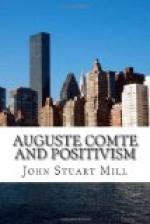M. Comte was accustomed to consider Descartes and Leibnitz as his principal precursors, and the only great philosophers (among many thinkers of high philosophic capacity) in modern times. It was to their minds that he considered his own to bear the nearest resemblance. Though we have not so lofty an opinion of any of the three as M. Comte had, we think the assimilation just: thes were, of all recorded thinkers, the two who bore most resemblance to M. Comte. They were like him in earnestness, like him, though scarcely equal to him, in confidence in themselves; they had the same extraordinary power of concatenation and co-ordination; they enriched human knowledge with great truths and great conceptions of method; they were, of all great scientific thinkers, the most consistent, and for that reason often the most absurd, because they shrank from no consequences, however contrary to common sense, to which their premises appeared to lead. Accordingly their names have come down to us associated with grand thoughts, with most important discoveries, and also with some of the most extravagantly wild and ludicrously absurd conceptions and theories which ever were solemnly propounded by thoughtful men. “We think M. Comte as great as either of these philosophers, and hardly more extravagant. Were we to speak our whole mind, we should call him superior to them: though not intrinsically, yet by the exertion of equal intellectual power in a more advanced state of human preparation; but also in an age less tolerant of palpable absurdities, and to which those he has committed, if not in themselves greater, at least appear more ridiculous.
THE END.
FOOTNOTES:
[1] See the Chapter on Efficient Causes in Reid’s “Essays on the Active Powers,” which is avowedly grounded on Newton’s ideas.
[2] Mr Herbert Spencer, who also distinguishes between abstract and concrete sciences, employs the terms in a different sense from that explained above. He calls a science abstract when its truths are merely ideal; when, like the truths of geometry, they are not exactly true of real things—or, like the so-called law of inertia (the persistence in direction and velocity of a motion once impressed) are “involved” in experience but never actually seen in it, being always more or less completely frustrated. Chemistry and biology he includes, on the contrary, among concrete sciences, because chemical combinations and decompositions, and the physiological action of tissues, do actually take place (as our senses testify) in the manner in which the scientific propositions state them to take place. We will not discuss the logical or philological propriety of either use of the terms abstract and concrete, in which twofold point of view very few of the numerous acceptations of these words are entirely defensible: but of the two distinctions M. Comte’s




